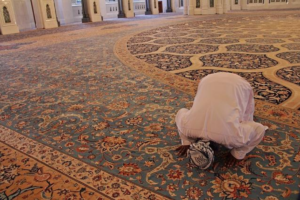
The Islamic practice of salat, the five daily prayers, is one of the most fundamental pillars of the faith. It is a ritual act of worship that serves as a direct connection between the believer and Allah (SWT). However, like any spiritual practice, its impact—whether for great good or great harm—depends entirely on the intention (niyyah) and consciousness (taqwa) with which it is performed. Salat is not merely a mechanical ritual; it is a profound tool for spiritual and moral transformation. When approached with sincerity and mindfulness, it can elevate the soul, purify the heart, and inspire righteous action. Conversely, when misused or performed with insincerity, it can become a means of self-deception, enabling harm rather than preventing it. This essay explores the dual nature of salat, examining its potential as a source of good or harm, and argues that its true purpose is to cultivate a continuous, mindful connection with Allah that transcends the ritual itself.
Salat as a Tool for Spiritual and Moral Transformation
At its core, salat is meant to be a voluntary, heartfelt desire to connect with Allah. It is not confined to the five prescribed times but is intended to permeate every aspect of a believer’s life. The Qur’an emphasizes the importance of mindfulness in prayer: “Establish prayer for My remembrance” (Qur’an 20:14). This verse underscores that salat is not merely a physical act but a means of cultivating constant awareness of Allah’s presence. When performed with sincerity, salat becomes a transformative practice that aligns the believer’s actions with divine will.
Benefits of Salat Performed with Right Intention
1. Spiritual Elevation and Inner Peace: Salat, when performed mindfully, serves as a spiritual anchor. It provides moments of reflection and stillness in a chaotic world, allowing the believer to recenter themselves on their purpose in life. The Prophet Muhammad (peace be upon him) described salat as a “coolness of the eyes,” a source of comfort and solace. This inner peace radiates outward, influencing the believer’s interactions with others and fostering compassion and empathy.
2. Moral Discipline and Self-Accountability: The regularity of salat instills discipline and self-control. By pausing five times a day to stand before Allah, the believer is reminded of their moral responsibilities. This constant reminder helps to curb negative impulses and encourages ethical behavior. For example, a person who prays sincerely is less likely to engage in dishonesty or harm others, as they are acutely aware of Allah’s omnipresence.
3. Community and Social Cohesion: Salat performed in congregation, such as the Friday prayer (Jumu’ah), fosters a sense of unity and solidarity among believers. It breaks down barriers of race, class, and nationality, reminding Muslims of their shared humanity and collective responsibility to uphold justice and compassion.
Salat as a Potential Source of Harm When Misused
While salat has the potential for immense good, it can also become a source of harm if misused. This occurs when the ritual is divorced from its spiritual essence and reduced to a mechanical or performative act. The Qur’an warns against such empty rituals: “So woe to those who pray but are heedless of their prayer—those who are all show and forbid common kindnesses” (Qur’an 107:4-7). This verse highlights the danger of using salat as a facade to mask unethical behavior.
Examples of Harm Caused by Misusing Salat
1. Self-Deception and Moral Complacency: One of the most insidious dangers of misusing salat is the belief that the ritual alone can absolve one of moral responsibility. For example, a person who engages in corruption or harm during the day may perform salat with the misguided belief that their prayers will “erase” their wrongdoing. This mindset transforms salat into a tool of self-deception, enabling the individual to continue their harmful actions without genuine repentance or change. In this way, salat becomes a catalyst for further harm, as the individual feels a false sense of security in their piety.
2.Hypocrisy and Social Harm: When salat is used as a performative act to gain social approval or religious authority, it can lead to hypocrisy. For instance, a leader who publicly emphasizes their devotion to prayer while exploiting or oppressing others undermines the very principles of justice and compassion that Islam upholds. This misuse of salat not only harms the individual’s soul but also erodes trust in religious institutions and perpetuates social injustice.
3. Neglect of Broader Responsibilities: Salat is meant to inspire action, not replace it. However, when reduced to a ritualistic checkbox, it can lead to a neglect of broader responsibilities. For example, a person who prays regularly but ignores the suffering of others or fails to contribute to their community has misunderstood the purpose of salat. The Prophet Muhammad (peace be upon him) emphasized that true faith is reflected in one’s actions: “Whoever does not abandon false speech and evil actions, Allah has no need of their abandoning food and drink (i.e., fasting)” (Sahih Bukhari). This principle applies equally to salat.
Salat as a Continuous Connection with Allah
To fully realize the potential of salat, it must be understood as more than a ritual; it is a means of cultivating a continuous, mindful connection with Allah. The five daily prayers are not an end in themselves but a tool to train the soul to remain conscious of Allah throughout the day. This broader understanding of salat aligns with the Qur’anic concept of taqwa (God-consciousness), which is the ultimate goal of Islamic worship.
Practical Steps for Mindful Salat
1. Intention (Niyyah): Before performing salat, the believer should reflect on their intention. Are they praying to fulfill an obligation, or are they genuinely seeking to connect with Allah?
This reflection helps to ensure that salat remains a sincere act of worship.
2. Mindfulness (Khushu’): During salat, the believer should strive for khushu’, a state of humility and focus. This requires minimizing distractions and reflecting on the meanings of the verses recited. Practicing mindfulness in salat trains the believer to carry this awareness into their daily life.
3. Integration with Daily Actions: Salat should inspire ethical behavior and social responsibility. For example, the remembrance of Allah in prayer should motivate the believer to act justly, show kindness, and stand against oppression. In this way, salat becomes a catalyst for positive change in both the individual and society.
Conclusion: Salat as a Mirror of the Soul
Salat is a profound spiritual practice with the potential to transform individuals and societies. However, its impact depends entirely on the intention and consciousness with which it is performed. When approached with sincerity and mindfulness, salat elevates the soul, fosters moral discipline, and inspires righteous action. Conversely, when misused, it can become a tool of self-deception, enabling harm and perpetuating injustice. Ultimately, salat is a mirror of the soul, reflecting the believer’s true relationship with Allah. It is not merely a ritual to be performed but a continuous journey of spiritual growth and ethical living. As the Qur’an reminds us, “Indeed, prayer prohibits immorality and wrongdoing, and the remembrance of Allah is greater” (Qur’an 29:45). May we strive to make our prayers a source of good, both for ourselves and for the world around us.


